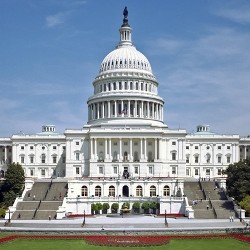Harry Reid Said to be Eyeing Federal Online Gambling Clampdown

Online poker players in the U.S. have long regarded Senate Majority Leader Harry Reid as an ally in their push for legal U.S. online poker.
But according to rumors currently circulating around Washington D.C., those same players may soon have good reason to change their opinion of Reid.
That’s because the senior senator from Nevada is said to be considering a legislative push that would issue a blanket ban against all online gambling in America – both interstate and intrastate.
Rumors say Senate leader eyeing Wire Act update
The story at this stage is that Harry Reid is putting together a bill that would update the Wire Act to deal more directly with the issue of online gambling. Specifically, Reid would amend the Act to expressly prohibit any sort of online gambling in the United States.
As it currently stands, the Wire Act – which predates the mainstream emergence of the Internet by several decades – is not thought to apply to any online gambling except for sports betting. That line of thinking draws directly from a Department of Justice memo released in late 2011 in response to questions from states regarding the legality of intrastate online gambling.
These rumors first emerged at the start of August, with multiple sources – including GGB’s Roger Gros and PokerNews’ Brett Collson – suggesting on Twitter that Reid was working behind the scenes to build support for a Wire Act strengthening or similar bill.
It’s unclear what impact, if any, such a bill would have on sites that currently offer online poker to Americans.
Exemptions might follow a ban
The silver lining for American fans of online poker is that Reid’s bill to eliminate all online gambling could be a precursor to a parallel effort that carves out an exemption specifically for poker.
It’s also assumed that the powerful horse racing lobby – who have a staunch ally in Reid’s Republican counterpart in the Senate, Minority Leader Mitch McConnell of Kentucky – would also be able to successfully position themselves alongside (arguably ahead of) online poker. That seems especially likely considering the fact that online horse betting is already heavily entrenched in many states and represents an industry worth tens of millions of dollars annually even in its’ current limited form.
Would casinos push back against Reid’s attempt?
It seems obvious that Nevada casinos would be wildly unhappy about a push by Reid to outlaw all forms of online gambling. After all, many of them have already sunk considerable time and effort into pursuing regulated online gambling.
But while their opposition to any effort by Reid to roll back online gambling regulation makes sense on that level, there are other issues in play. Most pressing for casinos is the theory that state-by-state regulated online gambling will introduce a powerful new competitor to land-based casinos in the form of dramatically expanded state lotteries.
Facing the threat of that competition for the finite pool of gambling dollars available among American consumers, casinos may have decided that online gambling represents more of a danger than an opportunity – or at least online gambling rolled out on a state-by-state basis does. And if that’s the conclusion they’ve reached, then there’s little reason for them to push back against efforts by Reid to simply ban the activity across the board.
Numerous past attempts by Reid have come up short
Reid has made a go at online gambling regulation a number of times since 2010. Most notably, he and now-retired Senator Jon Kyl tried to sell a bipartisan bill that updated the Wire Act to outlaw online gambling while making exceptions for a few activities such as horse betting and poker.
That rather high-profile attempt saw several false starts in 2012 before ultimately failing to gain any traction during the end of year lame duck session that marked Kyl’s departure from Congress.
What Reid has never tried to do is present a bill that contains only a ban, with no exemptions. Such a bill would arguably have an easier time getting through the House. But whether Reid can shepherd that legislation through the Senate – or if he can even convince his casino constituents that such a bill is wise policy – remains an open question.










